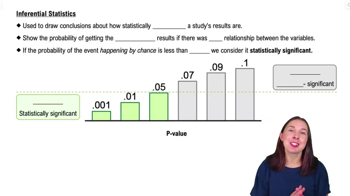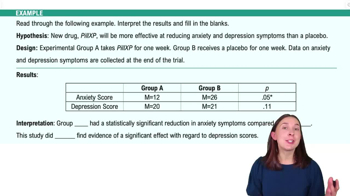Table of contents
- 1. Introduction to Psychology1h 43m
- 2. Psychology Research2h 20m
- 3. Biological Psychology2h 41m
- 4. Sensation and Perception28m
- 5. Consciousness and Sleep32m
- 6. Learning41m
- 7. Memory34m
- 8. Cognition37m
- 9. Emotion and Motivation35m
- 10. Developmental Psychology33m
- 11. Personality48m
- 12. Social Psychology41m
- 13. Stress and Health41m
- 14. Psychological Disorders44m
- 15. Treatment47m
2. Psychology Research
Evaluating Research Findings
Struggling with Psychology?
Join thousands of students who trust us to help them ace their exams!Watch the first videoMultiple Choice
The theory of motivation in which the social context of an action has an effect on the type of motivation existing for the action is known as
A
the expectancy-value theory.
B
the drive-reduction theory.
C
the self-determination theory
D
Dweck's theory of motivation.
 Verified step by step guidance
Verified step by step guidance1
Begin by understanding the key components of each theory of motivation mentioned in the problem.
The expectancy-value theory suggests that motivation is determined by the expectation of success and the value of the goal.
The drive-reduction theory posits that motivation arises from the need to reduce internal tension caused by unmet biological needs.
Dweck's theory of motivation focuses on the role of mindset, particularly the belief in fixed versus growth mindsets, in influencing motivation.
The self-determination theory emphasizes the role of social context in motivation, highlighting intrinsic and extrinsic motivation and the need for autonomy, competence, and relatedness.

 6:00m
6:00mWatch next
Master Descriptive Statistics – Measures of Central Tendency with a bite sized video explanation from Hannah Gordils
Start learningRelated Videos
Related Practice















![Ethical Guidelines in Psychology [AP Psychology Unit 1 Topic 6] (1.6)](https://img.youtube.com/vi/ilq2nGO7_QA/mqdefault.jpg)





























